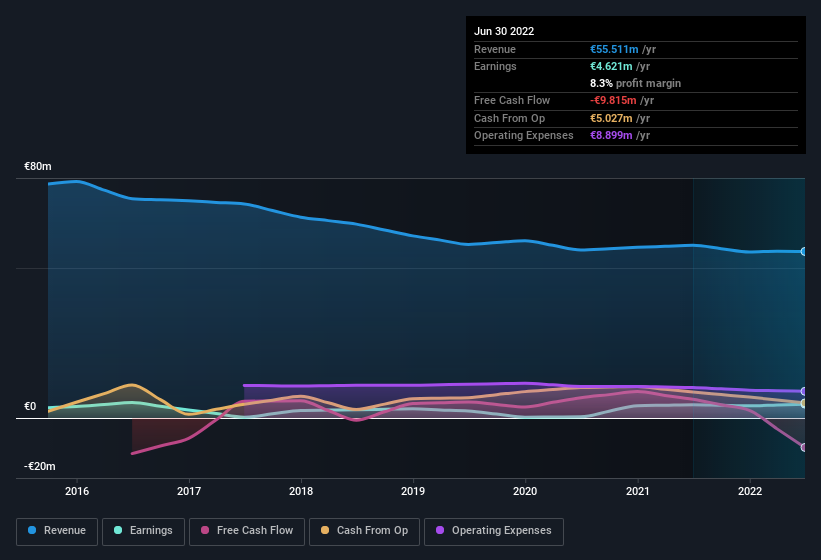Dierig Holding (ETR:DIE) Strong Profits May Be Masking Some Underlying Issues
The recent earnings posted by Dierig Holding AG (ETR:DIE) were solid, but the stock didn't move as much as we expected. We believe that shareholders have noticed some concerning factors beyond the statutory profit numbers.
Check out our latest analysis for Dierig Holding

Examining Cashflow Against Dierig Holding's Earnings
As finance nerds would already know, the accrual ratio from cashflow is a key measure for assessing how well a company's free cash flow (FCF) matches its profit. The accrual ratio subtracts the FCF from the profit for a given period, and divides the result by the average operating assets of the company over that time. You could think of the accrual ratio from cashflow as the 'non-FCF profit ratio'.
That means a negative accrual ratio is a good thing, because it shows that the company is bringing in more free cash flow than its profit would suggest. While it's not a problem to have a positive accrual ratio, indicating a certain level of non-cash profits, a high accrual ratio is arguably a bad thing, because it indicates paper profits are not matched by cash flow. That's because some academic studies have suggested that high accruals ratios tend to lead to lower profit or less profit growth.
Dierig Holding has an accrual ratio of 0.21 for the year to June 2022. We can therefore deduce that its free cash flow fell well short of covering its statutory profit. Even though it reported a profit of €4.62m, a look at free cash flow indicates it actually burnt through €9.8m in the last year. It's worth noting that Dierig Holding generated positive FCF of €6.2m a year ago, so at least they've done it in the past. One positive for Dierig Holding shareholders is that it's accrual ratio was significantly better last year, providing reason to believe that it may return to stronger cash conversion in the future. As a result, some shareholders may be looking for stronger cash conversion in the current year.
Note: we always recommend investors check balance sheet strength. Click here to be taken to our balance sheet analysis of Dierig Holding.
Our Take On Dierig Holding's Profit Performance
Dierig Holding's accrual ratio for the last twelve months signifies cash conversion is less than ideal, which is a negative when it comes to our view of its earnings. Because of this, we think that it may be that Dierig Holding's statutory profits are better than its underlying earnings power. But on the bright side, its earnings per share have grown at an extremely impressive rate over the last three years. Of course, we've only just scratched the surface when it comes to analysing its earnings; one could also consider margins, forecast growth, and return on investment, among other factors. If you'd like to know more about Dierig Holding as a business, it's important to be aware of any risks it's facing. For example, Dierig Holding has 2 warning signs (and 1 which makes us a bit uncomfortable) we think you should know about.
This note has only looked at a single factor that sheds light on the nature of Dierig Holding's profit. But there are plenty of other ways to inform your opinion of a company. Some people consider a high return on equity to be a good sign of a quality business. So you may wish to see this free collection of companies boasting high return on equity, or this list of stocks that insiders are buying.
New: Manage All Your Stock Portfolios in One Place
We've created the ultimate portfolio companion for stock investors, and it's free.
• Connect an unlimited number of Portfolios and see your total in one currency
• Be alerted to new Warning Signs or Risks via email or mobile
• Track the Fair Value of your stocks
Have feedback on this article? Concerned about the content? Get in touch with us directly. Alternatively, email editorial-team (at) simplywallst.com.
This article by Simply Wall St is general in nature. We provide commentary based on historical data and analyst forecasts only using an unbiased methodology and our articles are not intended to be financial advice. It does not constitute a recommendation to buy or sell any stock, and does not take account of your objectives, or your financial situation. We aim to bring you long-term focused analysis driven by fundamental data. Note that our analysis may not factor in the latest price-sensitive company announcements or qualitative material. Simply Wall St has no position in any stocks mentioned.
About XTRA:DIE
Dierig Holding
Engages in textiles business in Germany, rest of Europe, and internationally.
Moderate risk and fair value.
Market Insights
Community Narratives



